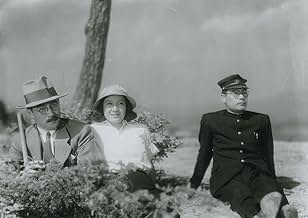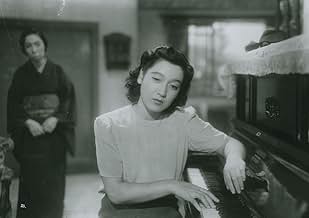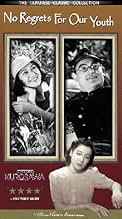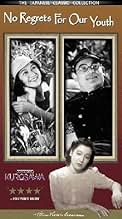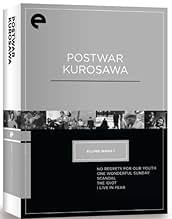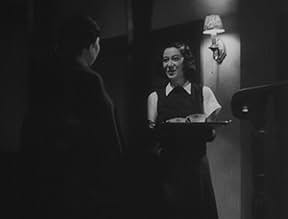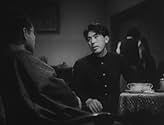Adicionar um enredo no seu idiomaThe daughter of a politically disgraced university professor struggles to find a place for herself in love and life, in the uncertain world of Japan leading into WWII.The daughter of a politically disgraced university professor struggles to find a place for herself in love and life, in the uncertain world of Japan leading into WWII.The daughter of a politically disgraced university professor struggles to find a place for herself in love and life, in the uncertain world of Japan leading into WWII.
- Direção
- Roteiristas
- Artistas
Avaliações em destaque
One character was inspired by the real-life Hotsumi Ozaki, who assisted the famous Soviet spy Richard Sorge and so became the only Japanese citizen to suffer the death penalty for treason during World War II. It is this aspect that makes the film particularly interesting, as it reflects on the role Japan played in the world from 1933-1945.
The film as a whole is interesting for being made so soon after World War II. Clearly the budget and production value is limited, but you might expect a country ravaged by war would be too busy with other things to make movies. Not so when you have a man named Kurosawa.
Yukie is excited by Noge's political passion, and they begin an intense, inevitably short-lived affair. When Noge goes to prison, she becomes politically enlightened to Japan's oppressive state, and after he dies, she decides to take his ashes to his parents and stay with them to work the fields. She endures a great deal of hardship, both from his uncaring parents and neighbors, who harass the family of a "traitor". Against the odds, Yukie endures and triumphs and despite a brief sojourn back to Kyoto, realizes her life is far more fulfilling with the peasants. Much of the plot is rather convoluted and the storyline jumpy, as the politically motivated Kurosawa seems more interested in drawing certain emotional responses from the viewer. Clarity is only a secondary consideration here, as he busily applies much of the visual flair that he would exhibit with greater impact in his later masterworks like "Rashomon" and "Seven Samurai".
Even at this early stage in his directorial career (it's only his fifth film), there are a number of his stylistic touches evident - a series of quick freeze shots to illustrate Yukie's traumatized response behind a closed door to Noge's surprise departure; the use of a slow exposure camera that causes an unearthly (and sometimes irritating) blurring effect when people are in motion; people lying in a pastoral setting staring skywards (mimicked recently by Chinese filmmakers like Yimou Zhang); Yukie's oddly exaggerated, out-of-sync piano playing; and large crowds rushing down steps in an Eisenstein-like manner. However, the film gains real emotional heft toward the end when Yukie struggles in the rice fields with Noge's mother (played almost unrecognizably by another Ozu regular, Haruko Sugimura) under Yukie's mantra of the dead husband/son, "No regrets in my life, no regrets whatsoever". It's a moving sequence which brings the story to its resonant conclusion.
Proving why she was one of Japan's favorite post-WWII film stars, Hara is superb in showing Yukie's initial flightiness and evolving political consciousness. The other performances are reasonable but hardly as memorable - Susumu Fujita as Noge, Akitake Kono as Itokawa (whom Yukie rejects at the end as unworthy to know where Noge's grave is due likely to his pro-war stance) and Denjiro Okochi as Yukie's father. The combination of the illustrious Kurosawa and the incandescent Hara is certainly compelling enough to warrant viewing.
The title of the movie comes from Noge's statement to Yukie halfway through the film - she does not know he has continued his involvement in the anti-war movement, although he has spent time in prison and China for protesting. He tells her he has no regrets for any of his actions. Yukie doesn't quite understand until he is arrested and eventually killed for spying. Yukie has the option of returning home to her parents, but instead she finds Noge's parents and moves in with them. There she suffers hardship, sickness, and the humiliation of being known as an anti-war collaborator. The central question of the movie is why did she do this? Was she trying to "hold on" to a lost lover? Did she feel guilt over not having been more active in the anti-war movement? Was this her penance for a mis-spent youth? Even more perplexing is the way she rebukes Isokawa at the end of the film by refusing to show him Noge's grave - Isokawa had supported Japanese involvement in the war.
Perhaps the film is about the mind-state of Japan after losing the war - those who opposed the war, or who struggled through hardship to live normal lives, should value their actions in spite of the consequences. Those who supported the war deserve scorn and share in the responsibility of bloodshed.
In addition to the artistic filming itself, the script truly drives the story and leads us to believe more of what Akira Kurosawa believed -- anti-Fascism, anti-Militarism, through the portrayal of events concerning Japanese imperial rule in the film. Through the eyes of Yukie we learn what it is like to be oppressed, and we learn the strength of the human spirit in its' resolute resistance to the militarism and fascism of her day; the power of the will is truly highlighted in this film, and the persistent commitment to doing good (similar to that portrayed by Watanabe in Ikiru) is very present.
The flashbacks to youth, the conjuring of memories, and the portrayal of the good times right next to the bad times, and the depth of human emotion that is revealed truly makes this film something worth watching. Some of the emotionality of the scenes (especially Yukie's emotional moments) portrays the existential angst that we all have, and her strength & perseverance represent everything we would like to have. It was a truly impacting story.
I was especially keen on the ability of Akira Kurosawa to take some of the most inward, personal moments of extreme sadness and put them into the film and, without any seeming prior explanation, the viewer is able to relate in their own way. This film highlights a philosophy of oneself against the world, and the importance of being true to one self. The message was portrayed very clearly and the end result is a masterpiece of Cinema that is greatly overlooked.
"No regrets for my youth" tells the story of the fight of some students against the militarist regime in Japan and their different destinies throughout the years, but the film focuses mainly on Yukie, that we see in the beginning, just as a spoilt girl, flirting with revolutionary games. She's very sensitive and soon notices how alienated from reality she is. The military government is slowly tightening its iron grip and silencing the opposition. Idealism has become dangerous in Japan.
Yukie now sees what's happening. She's very passionate in whatever she does. Yukie makes no compromises, but she's no fool either. The film will describe her journey - first, the fires of adolescence when the world seems to be out there just to fulfill her wishes, then self-awareness, fight, disillusion, suffering.... She and her friends will arrive to different conclusions and tread different roads.
In a way, "No regrets for my youth" is a coming of age film, in which politics, emotion and sex play an important role. Yukie wants to find her place in the world. She's not satisfied with her life and she's not satisfied with the world in which she's living. She wants to change them. "No regrets for my youth" shows how she tries to live up to her ideals.
In "No regrets for my youth" (as I said before) we feel the influence the Soviet (and Italian) masters had on Kurosawa. We see here a young Kurosawa - more spontaneous and enthusiastic (another Kurosawa film, more or less, along the same line is "Stray Dog" that takes place in post-war Japan). The camera is used effectively to show the landscape and people. The acting is more natural. We are spared the exaggerated gestures and movements that are seen in some of his later films. Setsuko Hara who plays Yukie is an extraordinary actress. She helps the film to achieve a truly great emotional depth. Highly recommended!
Você sabia?
- CuriosidadesFilming in 1946, just after the war, many of the cast and crew were living very poor lives, going hungry quite often. One of the actors recalled a personal story of his stomach growling during filming, causing the scene to have to be shot again.
- Citações
Title Card: After the Manchurian Incident the militarists attempted to unify domestic opinions in order to realize their ambition to invade Asia. They denounced as "Red" any ideology that might hinder their policy. Professors and students fought the suppression. The Kyoto University Disturbance was one of their struggles for freedom.
- ConexõesFeatured in The Pacific Century: Reinventing Japan (1992)
Principais escolhas
- How long is No Regrets for Our Youth?Fornecido pela Alexa
Detalhes
- Tempo de duração
- 1 h 50 min(110 min)
- Cor
- Mixagem de som
- Proporção
- 1.37 : 1

